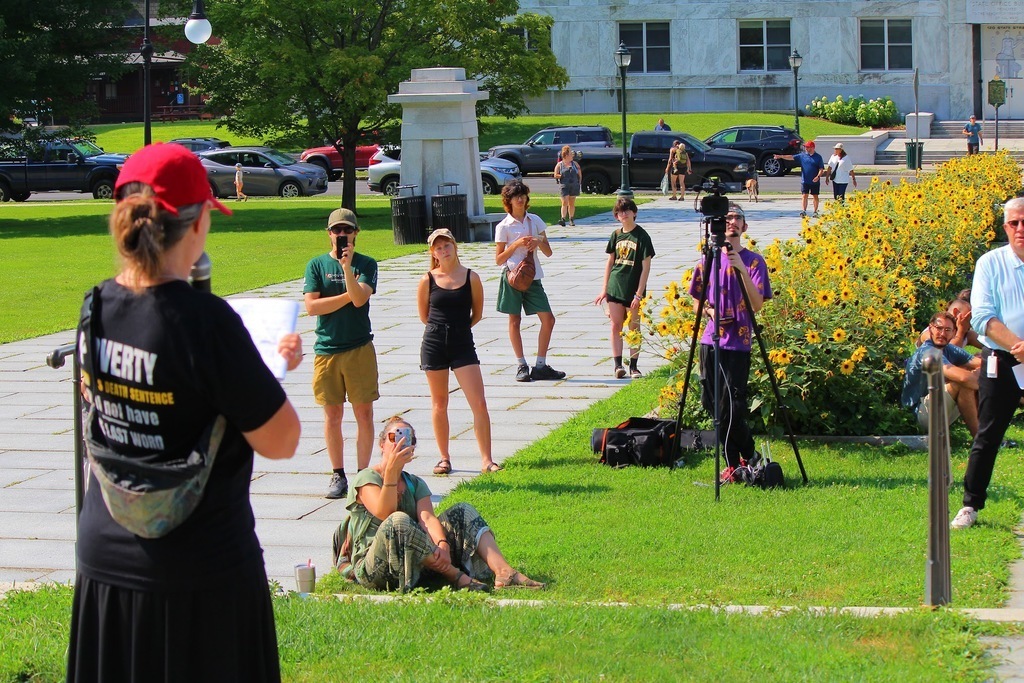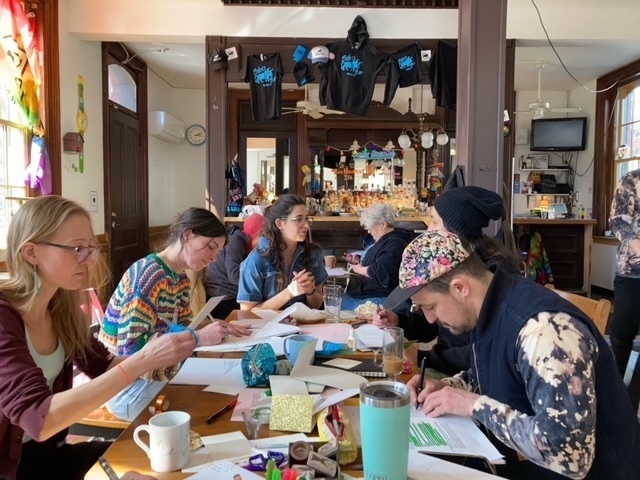CROs convenes coalitions by centering frontline leaders and marginalized voices and engaging in policy- and philanthropy-based systems change. When we facilitate and join coalitions, it is always towards the goal of shifting power and changing the conditions in which we are organizing. We also convene cohorts of grassroots workers to build alternate systems of care and support.
Just Recovery Coalition
In July 2024, folks on the front lines of flood response asked CROs to leverage our capacity to think bigger than was possible while standing in feet of muck. Grassroots leaders—people who care about their communities and show up again and again to do often-unpaid labor in the name of a better future—in the Northeast Kingdom and Central Vermont requested that CROs steward the creation of shared demands for a transformative recovery from flooding. This ask yielded the People’s Demands for a Just Recovery from Flooding.
In August of 2024, we hosted a press conference at the Vermont State House featuring speakers on the front lines of flooding; you can watch it here.
Since then, CROs has been anchoring the Just Recovery Coalition, a grassroots formation that seeks to influence policy-making around disaster response recovery and a just transition. We and our core partners—Northeast Kingdom Organizing, Cooperation Vermont, and the Land Access and Opportunity Board (LAOB)—know advocacy work has deep limitations, we also know our movements don’t have enough power to leave any on the table. Through the LAOB and other policymaking mechanisms, we’ll be able to bring grassroots voices into the rooms where policy decisions get made.
The Just Recovery Coalition meets monthly. If you’re interested in attending, sign onto the People’s Demands and we’ll follow up!

Previous Projects
Seeding Power
Beginning in 2020, CROs helped steward the Seeding Power Coalition, a collective of multi-racial organizers working on systemic changes that center BIPOC self-determination and healing relationships with land and between people.
The Every Town Project, which seeks to move at least one parcel of land into BIPOC stewardship in every town in Vermont, was and is doing this work from a grassroots perspective. The Seeding Power Coalition identified a need for the process of land redistribution to also exist within State processes and systems.
From 2020-2022 we worked with networks and community members to craft and advocate for the Vermont BIPOC-led Land Access and Opportunity Act (H.273), which was introduced in the Vermont House of Representatives in 2022, and passed during that legislative session.
Now, the Land Access and Opportunity Board (LAOB) exists to engage with Vermont organizations working on housing equity and land access “to recommend new opportunities and improve access to woodlands, farmland, and land and home ownership for Vermonters from historically marginalized or disadvantaged communities who continue to face barriers to land and home ownership.”
CROs and the LAOB are in deep collaboration on issues of housing and land equity both broadly speaking and around advocacy for the People’s Demands for a Just Recovery from Flooding.
Follow the Land Access and Opportunity Board here.

Moving Money
After hearing about the barriers from BIPOC-led organizations in VT to break into sustainable funding to establish and expand their work, CROs gathered with other organizers to convene a cohort of leaders in the philanthropy and nonprofit sectors.
This cohort invited leaders with decision-making power into a 6 month practice of monthly discussions, information sharing, and implementing and integrating resource redistribution plans into existing initiatives at their organizations.
This “Moving Money” cohort agreed on a set of anti-racist and wealth redistribution principles as a baseline for collaboration to redirect funding to BIPOC-led organizations. This work challenges social and structural barriers to accessing funding by under-resourced, early stage projects, by inviting funders to be more open, adaptable and proactive about funding BIPOC-led projects.
After six months of work, the cohort transitioned to be a peer support group with a project to raise funds for specific organizations using the tools they had created and used in the cohort—putting theory into practice.
